
B.C. failing to protect 81% of critical habitat for at-risk species: government docs
B.C. allows industrial logging in critical habitat for at-risk species — part of the reason...
Construction of the
Coastal GasLink pipeline could be delayed for months because the company is missing a key authorization from B.C.’s environmental assessment office, according to a consultant for Wet’suwet’en hereditary chiefs.
The delay offers a chance to de-escalate the stand-off between the RCMP and hereditary chiefs and their supporters, as tensions rise in anticipation of imminent arrests to enforce a court injunction, Jason Slade told The Narwhal.
“If the EAO [Environmental Assessment Office] follows the law, they won’t have authorization to proceed from the EAO for many months,” said Slade, an environmental consultant for the Unist’ot’en clan, one of five clans in the Wet’suwet’en Nation.
“There’s no need for the police to go in and arrest everyone. The EAO authorization to proceed in this area doesn’t exist.”
At the centre of the dispute over pipeline construction in Wet’suwet’en traditional territory is the $2 million Unist’ot’en healing centre, which has received $400,000 from B.C.’s First Nations Health Authority to run land-based trauma and addictions treatment programs.
Fundraising for the centre began about a decade ago and the first phase of construction commenced in 2015 with a recreational area and industrial kitchen. Counselling and office space was built in 2016, the same year the centre held its first annual youth art camp.
“There’s no need for the police to go in and arrest everyone. The EAO authorization to proceed in this area doesn’t exist.”
The healing centre is several hundred metres from a former, dead-end logging road and within one kilometre of the pipeline route, said Slade, who has been an environmental consultant for the clan for the past eight years.
“There’s not normally a lot of traffic on that road. Right now, every day there are dozens and dozens of trucks and machinery and personnel and security and police going up and down that road. This is something that happened all of a sudden … without consideration of the healing centre,” he said.

The healing centre at Unist’ot’en camp in Wet’suwet’en territory near Houston, B.C. on Jan. 15, 2020. Photo: Amber Bracken / The Narwhal
“The main building is where clients sleep and get fed. But there are cabins on the territory, trails, sweat lodges, gardens, a pit house, hunting sites, fishing sites … [the pipeline] is affecting the landscape in a huge way all around the healing centre.”
The $6.6 billion pipeline will transport fracked gas to the LNG Canada facility in Kitimat, where it will be cooled to below 160 degrees Celsius, compressed and turned into liquid for export to Asia and other foreign markets — an energy-intensive process that will make the project one of Canada’s biggest greenhouse gas-emitters.
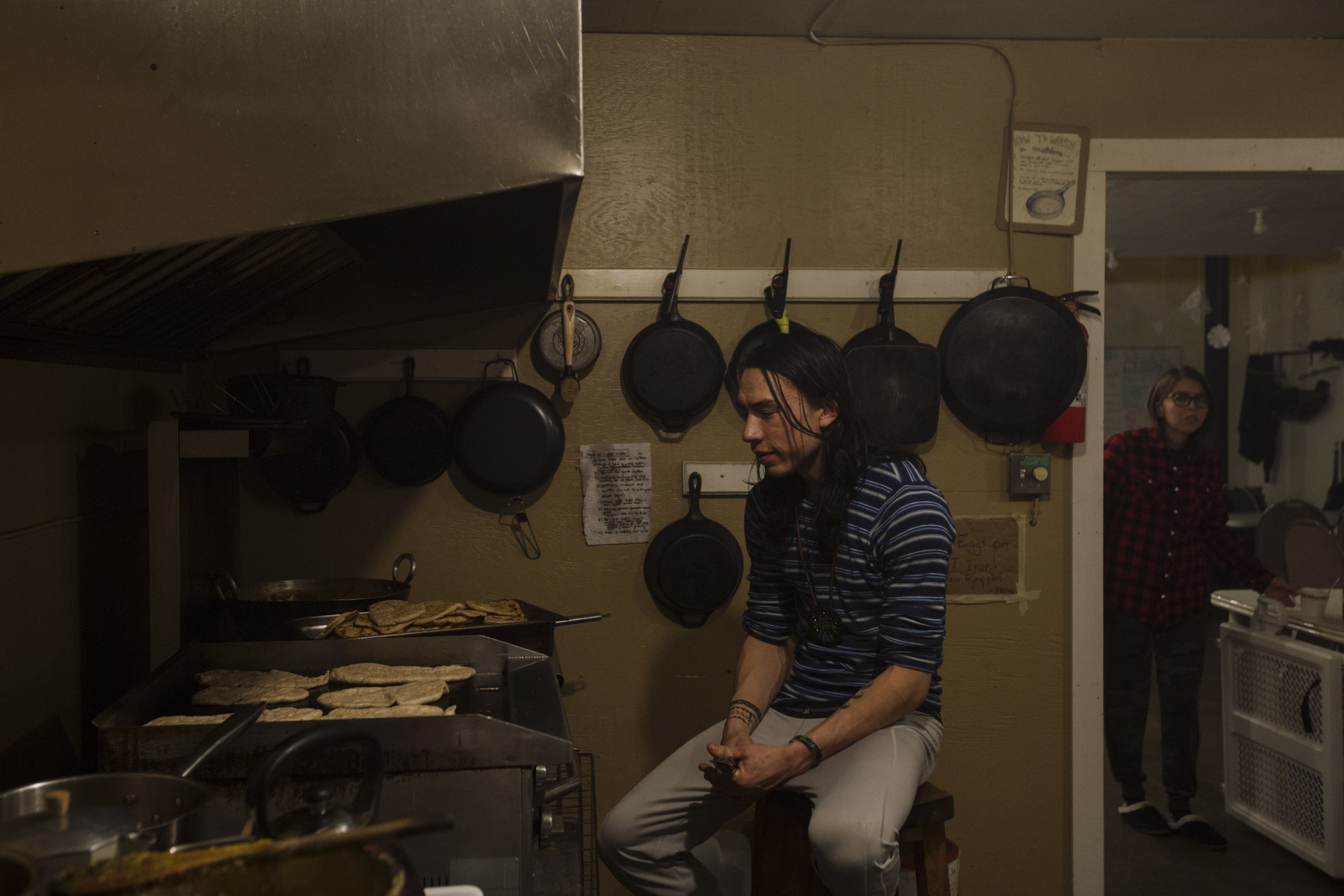
A Gitxsan supporter makes supper at the healing centre. Photo: Amber Bracken / The Narwhal
The B.C. environment ministry confirmed that one condition of Coastal GasLink’s environmental assessment certificate, issued in 2014, has not yet been met.
Coastal GasLink, a wholly owned subsidiary of TC Energy (formerly TransCanada Corp.), was required to submit a report about the pipeline’s potential effects on an area known as the “Morice River Technical Boundary” — an area that includes the healing centre. The environmental assessment office must deem that report satisfactory in order for pipeline construction to proceed in that area.
The technical boundary is the same area from which Wet’suwet’en hereditary chiefs, representing all five clans of the Wet’suwet’en Nation, recently evicted Coastal GasLink contractors.
Coastal GasLink submitted a report to the environmental assessment office in November but the hereditary chiefs say the report neglects to mention the healing centre, which they describe in a news release as “the most significant economic, social and health related institution within the study boundary.”
The assessment office will review the Coastal GasLink report over the next several weeks, according to the B.C. environment ministry. The review process will include consultation with the Wet’suwet’en, the ministry said in an email to The Narwhal.
“This process is part of our work to ensure industry — in this case CGL — is meeting the requirements of their environmental approval. EAO requirements will need to be met for CGL to proceed with construction,” the ministry confirmed.
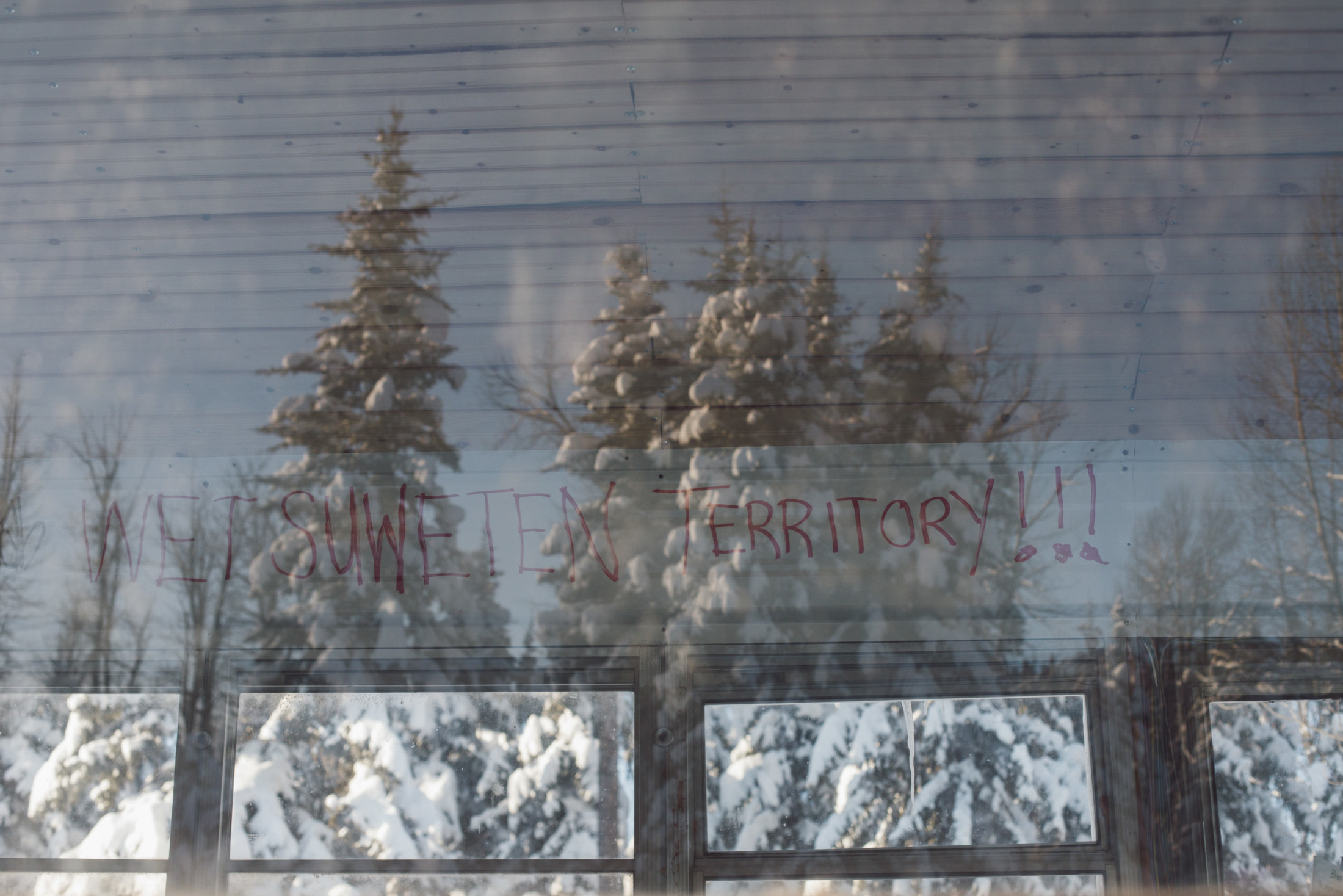
Trees are reflected in a bus window at a camp near Houston, B.C. Photo: Amber Bracken / The Narwhal
Gavin Smith, a lawyer with West Coast Environmental Law, said pipeline construction could be delayed for three or more months in the Morice River area if the environmental assessment office does not accept the Coastal GasLink report.
“If they do not approve the report, effectively Coastal GasLink has to go back to the drawing board and that clock would reset.” Coastal GasLink would then have to submit a new report 90 days before planned construction in the Morice River area, Smith said.
In early January, the RCMP set up a checkpoint to restrict access to a section of the Morice River forest service road where Wet’suwet’en hereditary chiefs and their supporters have remained despite the January 31 extension of a B.C. Supreme Court injunction to allow pipeline construction in the area.
Psychologist Karla Tait, director of clinical services for the Unist’ot’en healing centre, said the pipeline has already caused significant disruptions for culture-based health and wellness programming at the Indigenous-owned and operated centre.
Potentially vulnerable individuals, including youth and men and women in recovery who are partaking in trauma treatment programs, are affected by the project, said Tait, an Unist’ot’en house member, in an interview.
She said disruptions and safety concerns will heighten if a 400-person work camp for the project is built as planned.
“There’s a bit of that safety and security concern for us and for these clients as a steady stream of unknown workers, itinerant workers, travel to the work site past our territorial boundary and past our healing centre structures … ”
“It’s a constant stream of traffic on what used to be a calm and unoccupied road.”
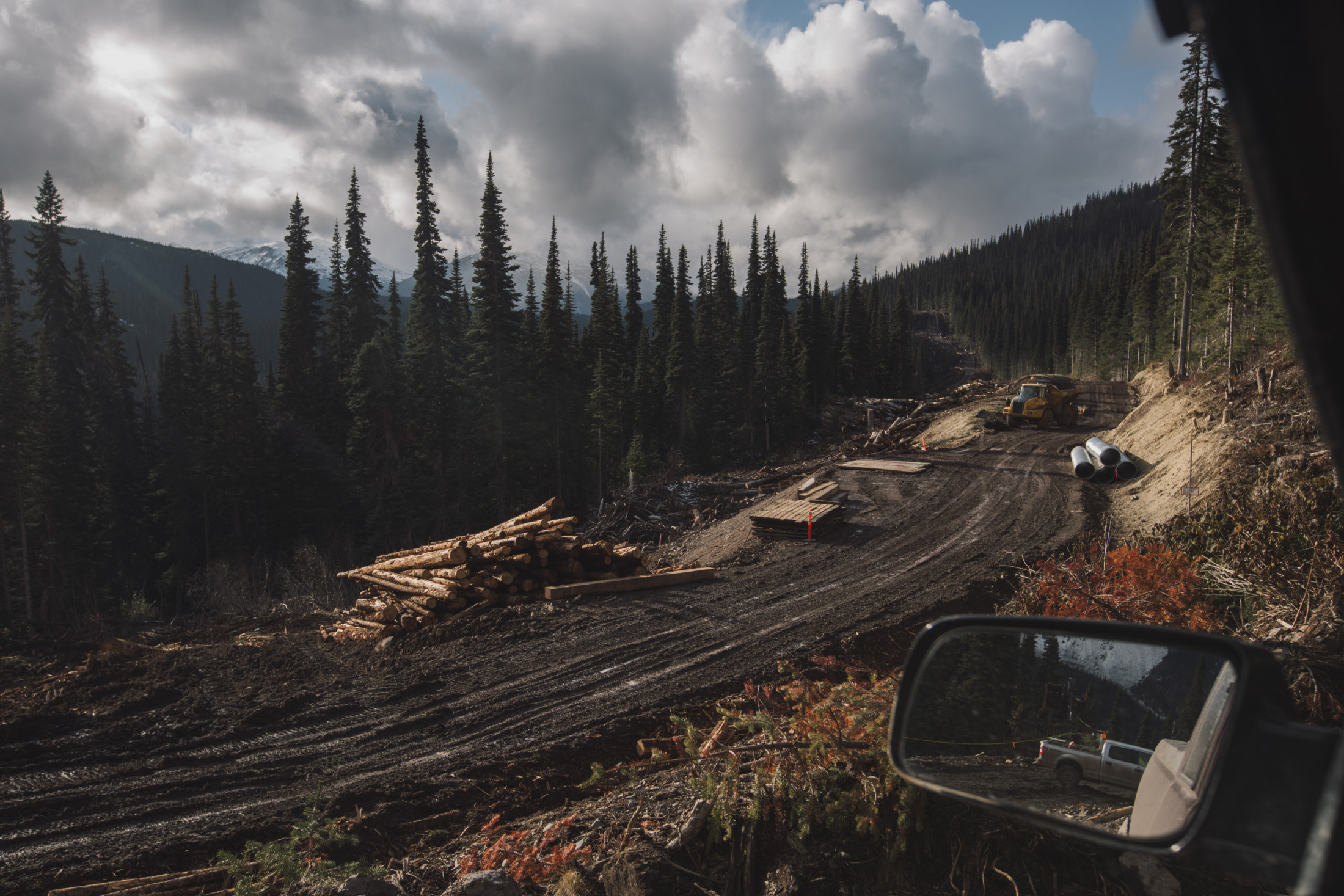
A newly cut and logged Coastal GasLink access road near Houston, in October 2019. Photo: Amber Bracken / The Narwhal
Land-based programs at the centre focus on revitalizing Wet’suwet’en cultural practices and include visits to cultural sites, Tait said.
One such site, the historic Kweese War Trail, was partially cleared by Coastal GasLink contractors despite repeated requests from hereditary chiefs to move the pipeline right of way in order to protect the trail, which branches out to ancestral sites spread throughout the nation’s traditional territory.
Tait said drilling and blasting along mountainsides has caused major noise disturbances and traffic that has driven away the moose population, which she said the Wet’suwet’en were carefully stewarding to become healthy enough to sustain a selective hunt.
“This past year we weren’t able to hunt at all with the presence of the CGL workers and with the disruption their activities were causing on the territory.”
Hereditary chiefs and other people remaining at the centre are now “in a holding pattern” while they wait to see if RCMP make arrests, said Tait, who declined to share the number of people at the centre due to security concerns.
Tait said the healing centre has been a long-term vision for the Unist’ot’en and was a motivating factor in her decision to complete a PhD in clinical psychology.
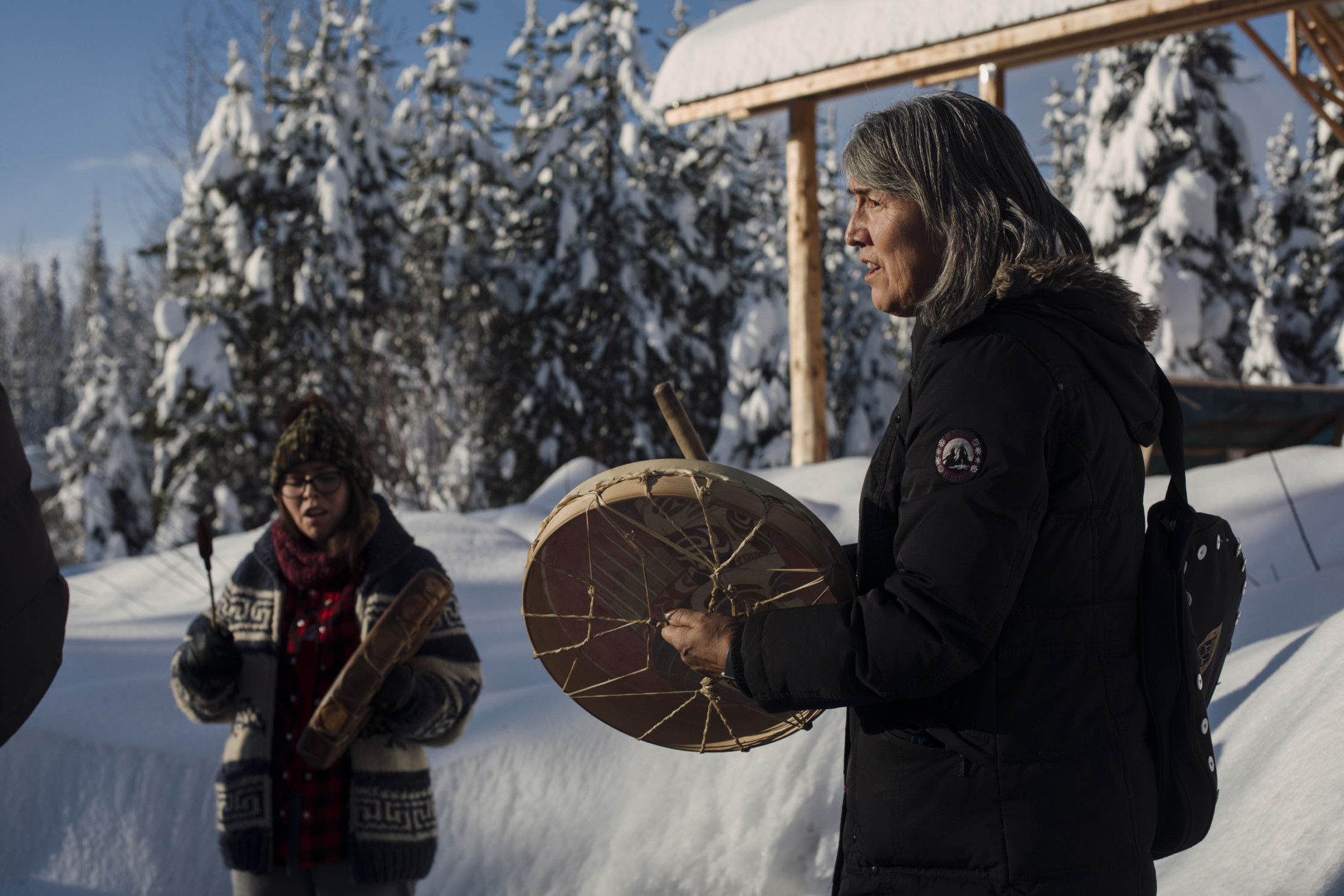
Freda Huson (right) and Karla Tait, who is the director of clinical programming at the healing centre, drum outside at Unist’ot’en camp on Jan. 20, 2020. Photo: Amber Bracken / The Narwhal
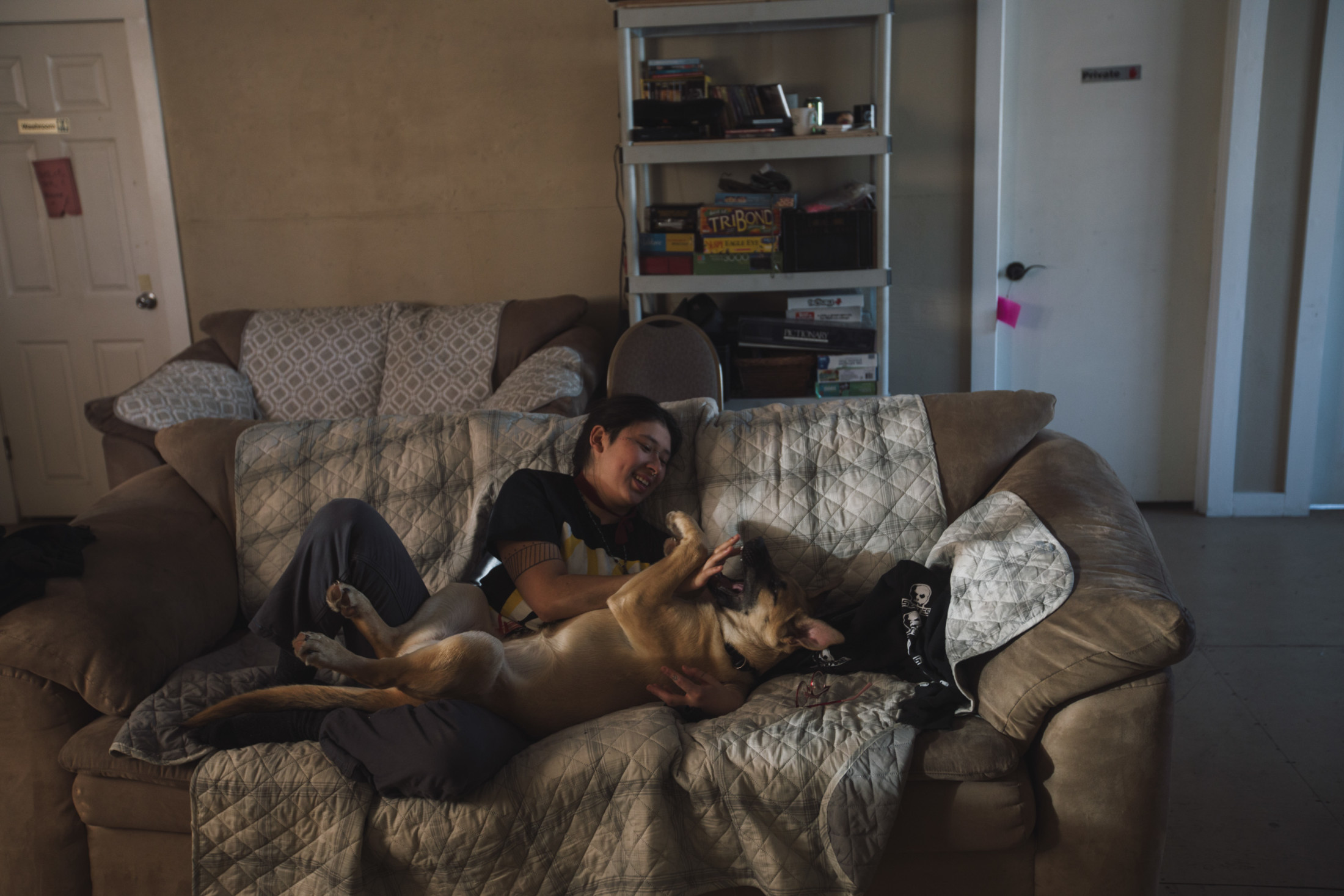
A Dene supporter plays with a puppy at the healing centre. Photo: Amber Bracken / The Narwhal
“It’s really hard to hear this place characterized as a protest camp. Our existence as Indigenous people, as Wet’suwet’en, is not only in relation to colonizers or to Canada or B.C. We’ve existed for millennia and we deserve the right to exist for millennia more,” Tait said.
“It’s not a protest camp. This is us preserving our way of life and our land and water for future generations. We deserve a right to be healthy and strong in that future.”
The Morice River — known as Wedzin Kwa — is a “pristine” water source from which the healing centre gets its water and where water ceremonies are conducted, Tait said. She said Coastal GasLink has informed Wet’suwet’en hereditary chiefs that the company will truck in drinking water if the pipeline pollutes the river, which feeds two major salmon bearing rivers.
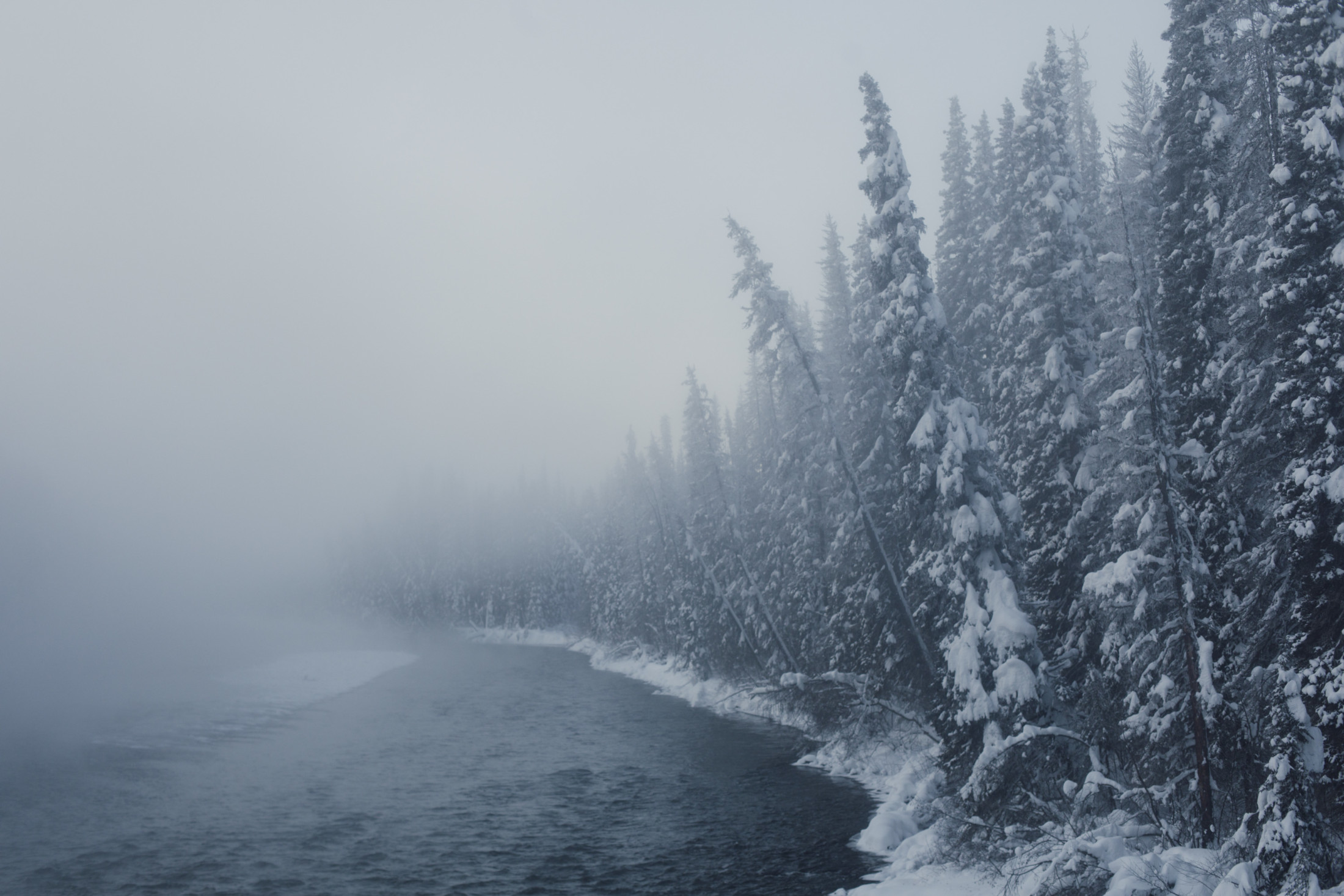
Wedzin Kwah, known as the Morice River, near the Unist’ot’en camp and healing centre. Photo: Amber Bracken / The Narwhal
Two weeks ago, B.C. Premier John Horgan told the media there is “nothing to negotiate” with Wet’suwet’en hereditary chiefs because all permits are in place for Coastal GasLink to build the 670-kilometre pipeline from the Dawson Creek area to Kitimat.
But on Jan. 27 the government backpedalled, appointing former MP Nathan Cullen (Skeena-Bulkley Valley) as a liaison between the province and Wet’suwet’en hereditary chiefs.
Cullen is tasked with acting as an intermediary “by providing fact-finding, facilitation and analysis to support a peaceful resolution” to the dispute.
According to a B.C. government press release, Cullen will work with the Wet’suwet’en, RCMP, Coastal GasLink, the B.C. public service and other parties, to de-escalate the conflict surrounding the injunction.
In an email to The Narwhal, the B.C. Oil and Gas Commission confirmed all “primary pipeline permits” have been issued.
The commission said it continues to review permit applications it receives from Coastal GasLink for roads, ancillary sites, archeology, water authorizations “and amendments to approved permits.”
To date, 211 permit authorizations have been granted, while 17 new applications are in process, the commission said.
A fact sheet about the Coastal GasLink pipeline, posted on the Oil and Gas Commission’s website, said approximately 400 authorizations are needed for the project.
The commission said the list of permits on its website is not current because it is in the process of updating to a new website, and that additional permit information will be uploaded as part of the refresh.
Slade said Coastal GasLink will have to consult with the healing centre’s owners, staff, clients and board of directors and may also have to speak with the First Nations Health Authority. The company will now have to conduct a study on the pipeline’s potential effects on the Unist’ot’en healing centre, which uses the entire landscape and requires unfettered access to the land, he said.
“The healing centre clients can’t be followed around by RCMP and CGL contractors. They’re out there hunting, fishing, trapping, on trails, in sweat lodges.”
Smith said the RCMP can still legally enforce the injunction.
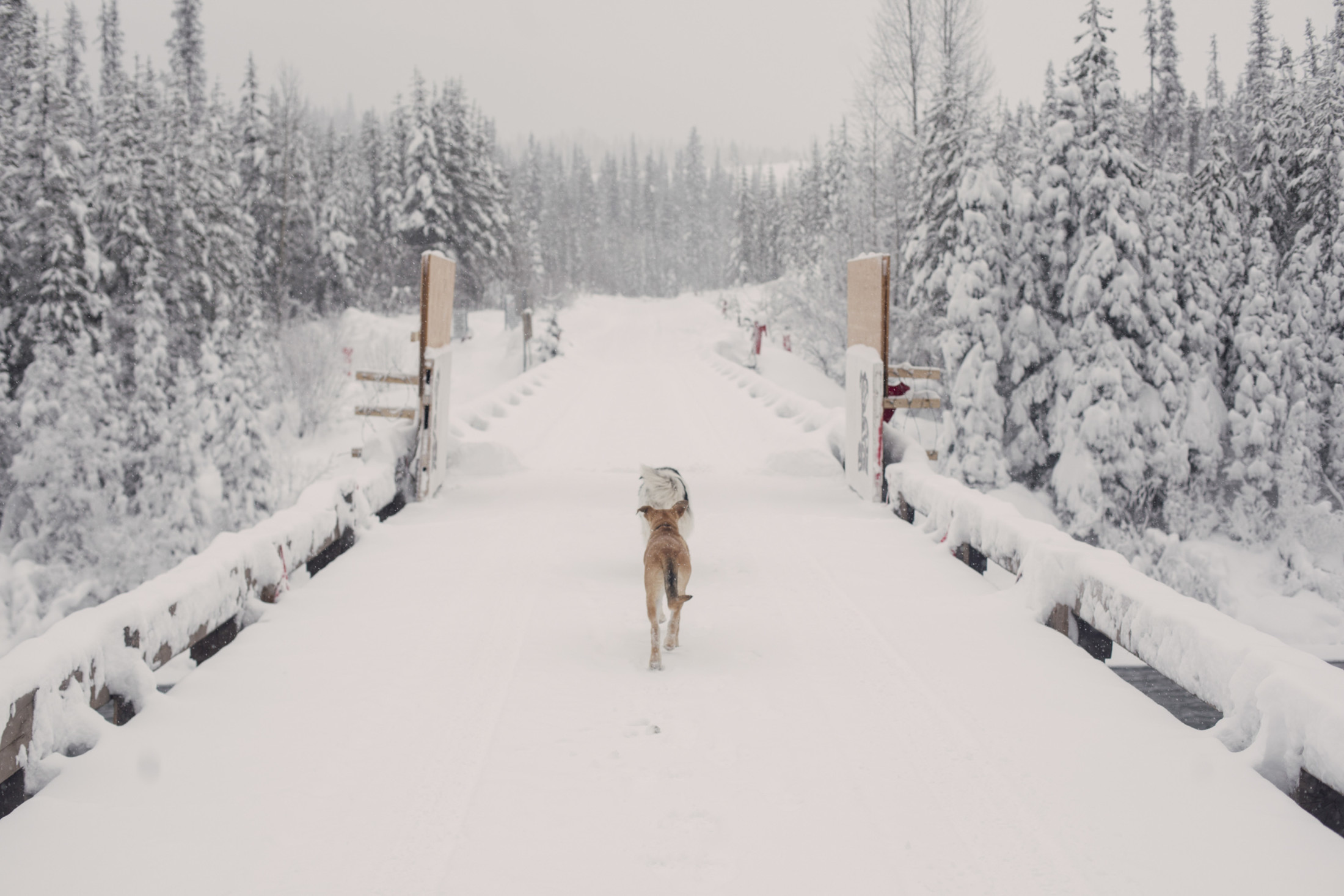
Dogs walk across the bridge outside of the Unist’ot’en camp. Photo: Amber Bracken / The Narwhal
“From a practical perspective the lack of the ability to begin construction in the area gives a strong reason to avoid any armed enforcement of that injunction to allow time for discussion and further recourse to the courts if parties decide to take that route,” he said.
“The environmental assessment office is no doubt aware that there are a lot of people watching this issue very closely and so they are going to presumably be taking a very careful look at the report that Coastal GasLink is required to file.”
Slade said the pipeline and related “industrial incursions” on the land are in direct conflict with the centre.
“This is not like a minor conflict. This is exactly what the environmental assessment process is supposed to mitigate … This is an institution run by a community that has section 35 rights and is a required consultation partner in the project.”
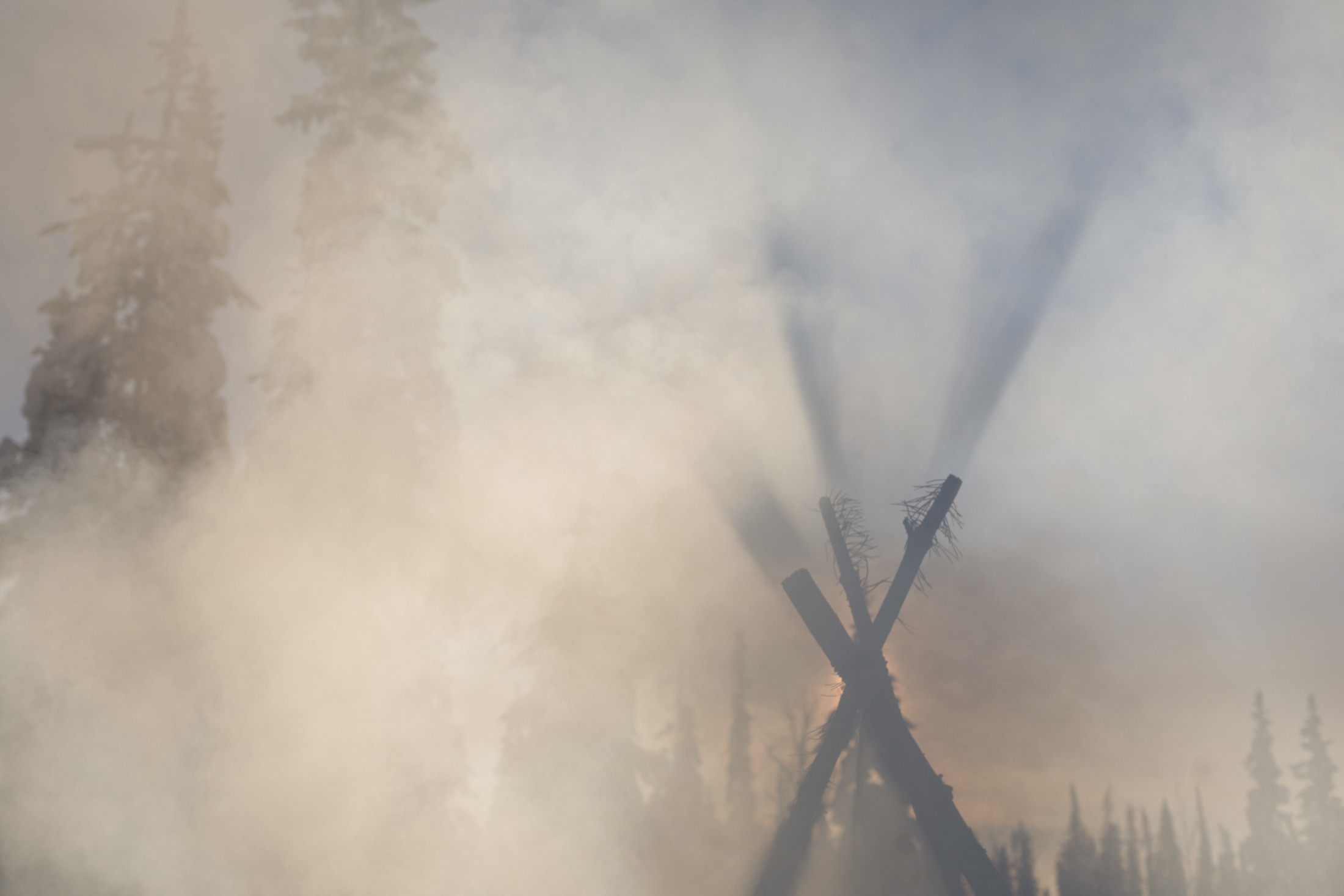
Smoke and steam rise from a campfire at a Wet’suwet’en camp. Photo: Amber Bracken / The Narwhal
Section 35 of the Canadian constitution recognizes and affirms Aboriginal and treaty rights.
Even if consultations on the report begin right away and are concluded rapidly, a 90-day comment period on the outcome is still required, Slade said.
“You’re talking about delays running on [for] many, many months, which gives time for the Wet’suwet’en court cases to be heard,” he said.
“They haven’t had their day in court.”
The Wet’suwet’en are exploring options for court action to challenge construction of the Coastal GasLink pipeline on their territory, including a constitutional challenge.
In a request backed by B.C.’s human rights commissioner Kasari Govender, the United Nations Committee on the Elimination of Racial Discrimination has called for an immediate suspension of the Coastal GasLink pipeline on Wet’suwet’en lands and territories until “free, prior and informed consent” is obtained from Indigenous peoples.
Calls to TC Energy’s offices in Vancouver and Calgary were not returned.
Get the inside scoop on The Narwhal’s environment and climate reporting by signing up for our free newsletter. Angello Johnson’s shoulders burn, and his arms...
Continue reading
B.C. allows industrial logging in critical habitat for at-risk species — part of the reason...

Lake sturgeon have long been culturally significant and nutritionally important to First Nations in Ontario,...

Mark Carney and the Liberals have won the 2025 election. Here’s what that means for...

